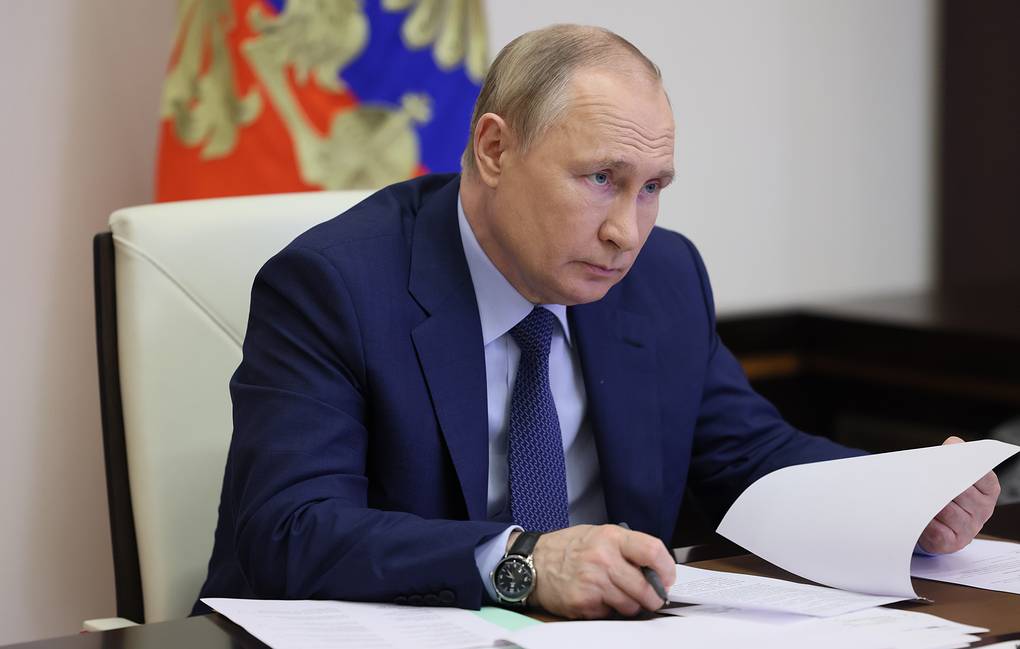Press review: Africa seeks Putin’s help and 1990s post-Soviet style chaos may hit Eurozone

Vedomosti: US intends to provide Ukraine with combat drones
The Biden administration will provide Ukraine with four MQ-1C Gray Eagle unmanned aircraft systems and a control station developed by the General Atomics company, Reuters reported, citing three sources familiar with the situation. According to the news outlet, in this case, the Ukrainian Armed Forces will receive weapons that are supposed to be far superior than the drones that Kiev already has. The Gray Eagle systems are capable of flying for over 30 hours, while the maximum flight duration for similar Turkish-made drones ranges between 12 and 24 hours, Vedomosti notes.
The White House is pursuing a policy of trial and error in terms of providing weapons to Ukraine, International Affairs Council Director General Andrey Kortunov noted. According to him, Washington is trying to distinguish the gray zone where it can supply weapons to Kiev and not be concerned about Russia’s harsh response.

Whether the United States will provide drones to Ukraine on a regular basis depends on Moscow’s retaliatory steps. Kortunov believes that if the Kremlin fails to take the necessary measures, the US administration will move on to supply Ukraine with more destructive weapons. However, the US does not want a direct confrontation with Moscow and is diligently trying to avoid escalating tensions, the expert added.
The Gray Eagle system is worth a lot in terms of local wars because it can stay in the air for a long time, but it’s unclear how it will perform in a war against a powerful enemy who has long-range air-defenses, Valdai Club expert Alexander Yermankov pointed out. The Ukrainians may try to use the Gray Eagle to find weak spots in Russia’s defense, taking advantage of longer patrols. However, these drones will clearly become a priority target for Russia.
Nezavisimaya Gazeta: African nations to seek Putin’s help in avoiding famine
An African Union delegation led by Senegal’s President Macky Sall is expected in Russia. Along with discussions on Moscow’s cooperation with the continent’s nations, grain and other agricultural supplies will be one of the most crucial issues on the agenda as Africa is up against the danger of a famine. Sall is scheduled to hold talks with Russian President Vladimir Putin in the Black Sea resort of Sochi on Friday, Nezavisimaya Gazeta writes.
Talk about the starvation threat in Africa has been going on for a while. Agricultural shipments via Black Sea routes are stalled, particularly because Kiev has mined the waters around Odessa for fear of Russia trying to seize the port. In fact, Africa seeks to overcome two shocks in one go because due to the coronavirus pandemic, the economic situation on the continent left much to be desired even before the launch of Russia’s special military operation in Ukraine. Although Russia and Ukraine produce only a third of global wheat and barley exports, much of those are focused on Africa rather than on wealthier countries. This is why logistics and sanctions issues may trigger a genuine famine.
“The visit of the African Union’s delegation is actually nothing extraordinary because the parties exchange delegations a couple of times a year. It is during the pandemic that food price issues started to emerge. Besides, complications with foreign currency payments and Russia being prevented from making full use of maritime transport are creating additional difficulties. In particular, even if some companies agree to insure Russian vessels, their high rates inevitably affect prices for final customers,” Deputy Director of the Russian Academy of Sciences’ Institute for African Studies Leonid Fituni pointed out.
He emphasized that a discussion on the format of the second Russia-Africa summit is bound to be on the Moscow meeting’s agenda. In addition, the parties may also touch upon security issues, though they won’t be a priority this time.
Izvestia: Turkey launches military operation in northern Syria
Ankara has launched another military operation in northern Syria. According to Turkish President Recep Tayyip Erdogan, the 90-kilometer-wide area between the cities of Tell Rifaat and Manbij and the creation of a so-called security belt is the focus of the mission. A Syrian lawmaker told Izvestia that Damascus would do its best to resist Turkey’s invasion, adding that Ankara’s move had already facilitated a rapprochement between Kurdish forces and the Syrian government. On May 26, the parties carried out a joint patrol mission with the assistance of Russian aircraft.
Formally, the launch of a new operation will violate the agreements that Russia and Turkey reached in Sochi. However, Turkish political scientist Onur Sinan Guzaltan pointed out to the paper that Ankara had the right to self-defense and the operation was driven by the need to protect the country’s southern border against shelling attacks from Kurdish-held areas in northern Syria.
Chairman of the Syrian parliament’s International Committee Butrus al-Marjan, in turn, confirmed to Izvestia that the Syrian Army and the Syrian Democratic Forces (SDF) had conducted a joint patrol mission. According to the legislator, several indirect signals have been sent to the Turkish regime that the Syrian military is determined to contain any military action by Ankara. Another Syrian parliament member Saji Tohme told the paper that Turkey’s actions were aimed at seizing Syria’s northern areas.
Senior Research Fellow at the Russian Academy of Sciences’ Institute of Oriental Studies Boris Dolgov pointed out that “Ankara is violating the Sochi Agreements, by simply taking advantage of a situation where Russia is engaged in the Ukrainian conflict.” “Russia and Turkey indeed struck an agreement that Ankara could create a security zone that would be controlled by Turkish troops. However, what is happening at the moment is precisely a military operation, and that’s not what the Sochi accords were about. We saw the same in Idlib,” the expert stressed.
Media: Who would benefit from early end to OPEC+ deal
The OPEC+ group has decided to boost monthly oil output in July and August in order to reach pre-pandemic levels by September. Given the problems that Russia is facing in terms of oil exports, the move will slightly increase the market share of other participants, namely Saudi Arabia, Kommersant writes.
OPEC+’s decision means that the deal, made in May 2020, will be formally completed as early as in August. The key question is whether its main participants will continue to coordinate their activities on the global market or move to free competition. In fact, Saudi Arabia and the United Arab Emirates are the only countries who have significant free production capacities at the moment, which is why a potential extension of the deal is up to them, since other OPEC+ members aren’t able to increase production and are objectively interested in preserving the deal.
Although OPEC+’s decision will make it possible for other participants in the deal to additionally increase oil output and exports, it will not make up for the Russian oil that’s going to be removed from the market, ACRA’s Vasily Tanurkov noted. The long-term risk is that OPEC+ may continue to increase output in the future to fill the gap left by Russian oil, the expert added.
The move by OPEC+ can be viewed as a technical one, Associate Professor at the Russian Government’s Financial University Valery Andrianov told Rossiyskaya Gazeta. The step is aimed at slightly correcting the balance between supply and demand. Production will additionally grow only by 216,000 barrels per day in July and August. The amount is insignificant and can’t be considered as a replacement for Russian oil.
According to Andrianov, the market is very overheated due to the West’s political hysteria and by undertaking a modest intervention, OPEC+ is demonstrating that it has its finger on the pulse of the situation and is prepared to raise production if necessary.
Izvestia: New sanctions on Russia to plunge Europe into inflation shock
The Russia-targeted sanctions have plunged European countries into a crisis, making everything more expensive in the wake of the energy price surge. Eurozone inflation has hit a record high of 8.1%. Economists are sure that it’s just the beginning and the European Union’s sixth package of sanctions against Russia, which includes a partial oil ban, will send inflation spiraling out of control, Izvestia writes.
“We expect that the embargo will push oil prices higher by $15-20 per barrel, even though the restrictions are scheduled to come into effect in December, when energy demand usually falls. The price hike will make consumers in the EU spend more on fuel, accelerating inflation, which has already reached its highest level since the creation of the eurozone,” head of the Energy Development Center Kirill Melnikov emphasized.
“Rising energy prices will affect logistics and final customers will have to pay for it. This is why low value goods, including cheap daily commodities, will soar higher in price because the transportation component is more important for their final price tag,” said Anton Prokudin of Ingosstrakh Investment.
According to Associate Professor at the Economic Department of the Peoples’ Friendship University of Russia Sergey Chernikov, the processes that will take place in the EU in the coming 18 months will be similar to those that Russia went through in the early 1990s, with large population groups plummeting into poverty and governments canceling many social security benefits. Consequently, many everyday things – like having a cup of coffee in the morning – will become a luxury.
TASS is not responsible for the material quoted in these press reviews
SOURCE: TASS









